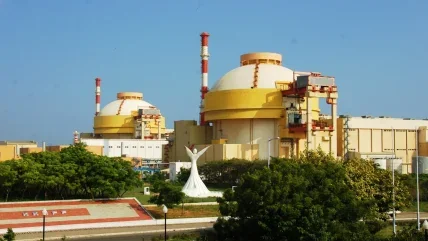
Naveen Jindal Group has established Jindal Nuclear Power Pvt Ltd hoping to construct 18 GWe of nuclear power capacity over the next 20 years with an investment of INR 1,800bn ($20bn). Jindal Nuclear will build, own, and operate NPPs based on state-of-the-art designs, leveraging advanced technologies including on Bharat Small Reactors (BSRs).
India’s indigenous 220 MWe pressurised heavy water reactor (PHWR) design is being modified and converted to Bharat Small Reactors, preparatory to being transferred to the private sector, Dr Ravi B Grover, a member of the Atomic Energy Commission in Ahmedabad and an Emeritus Professor at Homi Bhabha National Institute in Mumbai, said in August 2024. “India already has an operating 220 MWe PHWR design,” he noted, with several already operating. BSRs are simply 220 MWe PHWRs “with some improvements”, he explained.
“Jindal Nuclear will make signicant investments to build an 18 GWe of nuclear power generation capacity in the country over next two decades. This strategic initiative aligns with the Government of India’s Union Budget 2025 announcement, which targets 100 GWe of nuclear power capacity by 2047, supporting sustainable economic growth led by low emission industrialisation while significantly reducing the nation’s CO2 footprint,” the company said in a statement.
“The Indian government’s vision to set up 100 GW of nuclear energy by 2047 is exciting and visionary. At Jindal Nuclear, we are very bullish on nuclear energy and believe the private sector must play its role to realise this vision, said SK Sharma, Senior Advisor at Jindal Nuclear and a former Chairman of the Nuclear Power Corporation of India Limited (NPCIL).
Jindal Nuclear also plans to collaborate with global technology partners to maintain high safety standards and operational efficiency. The project is expected to generate significant employment opportunities across construction, operations, and related sectors. Jindal Nuclear, part of the Naveen Jindal Group, and a wholly owned subsidiary of Jindal Renewables, is focused on expanding its presence in the clean energy sector and contributing to India’s energy transition and sustainability goals.
Jindal Nuclear is the first private sector company to express interest in investing in nuclear. “The 18 GWe nuclear energy programme will be developed over the next two decades, incorporating a diverse mix of advanced technologies, including Bharat Small Reactors (BSRs), small modular reactors (SMRs), and Gen-IV reactors, as they reach deployment readiness,” the company said. “Jindal Nuclear aims to collaborate with global technology leaders, fostering innovation while maintaining world-class safety standards and operational excellence.”
Earlier in February, Minister of State Jitendra Singh affirmed that India’s nuclear energy sector will benefit from the entry of private sector players in the same way that the country’s space economy had done. This followed the announcement of the Union Budget for 2025-2026 that included promises to amend Indian legislation to encourage private sector participation in the nuclear sector.
Singh, who is the minister in charge of both the Department of Atomic Energy and the Department of Space, noted: “We are inviting private participation in the nuclear industry … we expect that the participation of private players would energise the nuclear power sector and help it grow rapidly. We have seen the kind of impact private players have had in the space sector. Something similar can happen in nuclear as well.”
The government’s target of 100 GWe of nuclear power by 2047 is “very realistic”, Singh added. “It is a challenging target, but not unachievable,” Singh said, referencing India’s space economy which is currently estimated to be worth $8.4bn and expected to grow to $44bn by 2033. “Once a certain threshold has been reached, and the right atmospheres created, the growth can be very fast.”
India’s Atomic Energy Act of 1962 prohibited private control of nuclear power generation restricting it to two government-owned enterprises – NPCIL and Bharatiya Nabhikiya Vidyut Nigam Limited (BHAVINI, set up to build and operate fast reactors). The act was amended in 2016 to allow public sector joint ventures but private sector companies and foreign investments were not permitted.






